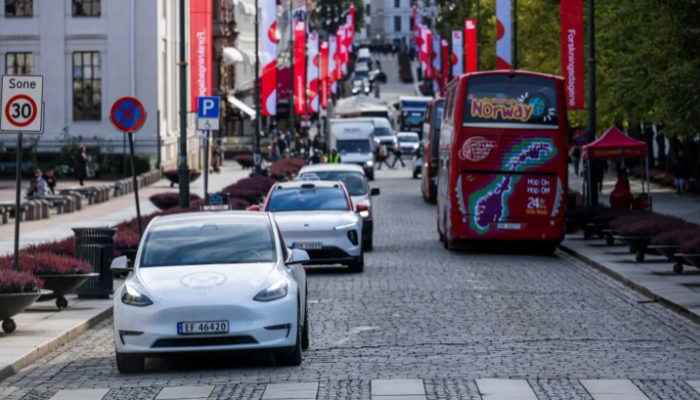
OSLO, Norway — In Norway, electric vehicles are no longer the exception — they are the norm.
The affluent Nordic nation, renowned for its substantial oil and gas reserves in the North Sea, has emerged as a global leader in phasing out internal combustion engine (ICE) vehicles. Through a sustained series of policy interventions—including tax breaks, toll exemptions, and reduced registration fees—Norway has positioned itself on the brink of eliminating gasoline and diesel cars from its new vehicle market entirely.
In some of Norway’s largest cities, fully electric vehicles now account for around 30% of all passenger cars on the roads. In Oslo, that number climbs even higher, with approximately 40% of cars in the capital now fully electric, according to the Norwegian EV Association (NEVA), which advocates for electric vehicle owners across the country.
A walk through Oslo’s city center reveals the scale of this shift. Standing at any crosswalk, one is likely to witness a constant flow of electric cars passing by—Teslas, VWs, Nissans, and other EVs quietly navigating the streets.
“It’s become so visible, yet people might not even notice how remarkable this is because it happened so quickly,” said Christina Bu, Secretary General of NEVA, in an interview with CNBC at the association’s Oslo headquarters. “The air is cleaner, the streets are quieter, and the transition hasn’t come at a high cost to consumers. In fact, they enjoy driving EVs—it’s practical, affordable, and efficient.”
Norway’s transformation has been swift and dramatic. Electric vehicles made up less than 1% of total new car sales in 2010. By last year, that figure had surged to 88.9%, and the momentum continues in 2025.
Recent figures from the Norwegian Public Roads Administration indicate that more than 93% of all new cars sold in the country so far this year are electric, marking a significant step toward the country’s goal of ending ICE vehicle sales altogether.
Norway’s success is now seen as a model for other countries seeking to reduce emissions and promote sustainable transport—showing that with the right incentives, consumer support, and infrastructure, rapid EV adoption is not only possible but practical.
In Norway, heavy taxation is phasing out high-emission vehicles.
By comparison, electric vehicle sales accounted for 15.4% of the total European Union market share in the first few months of 2025. Norway is not a member of the EU.
Stateside, the share of new passenger EV sales hit 10% in 2023, according to the Rocky Mountain Institute, up from 1% adoption as recently as 2017.
Tax incentives and public infrastructure
Norway’s State Secretary in the Ministry of Transport Cecilie Knibe Kroglund said the country’s success in transitioning away from combustion cars has been driven by long-term and consistent policymaking.
“We have a lot of tax incentives and user incentives, which are the most important things, and also infrastructure, of course,” Kroglund said during an interview in Oslo.
Norway’s success in electric vehicle adoption is supported by a range of targeted incentives. These include exemption from value-added tax (VAT), reduced road and parking fees, and access to bus lanes for EV drivers. Additionally, the government has made substantial investments in public charging infrastructure, while many households benefit from the convenience of home charging.
One contributing factor to Norway’s rapid EV transition is the absence of a strong automotive industry lobby, which has allowed environmental policy to advance with fewer obstacles.
According to Christina Bu, Secretary General of the Norwegian EV Association (NEVA), the country recently reached a major milestone, surpassing 10,000 fast chargers nationwide. Although the distribution of these chargers is uneven—concentrated more heavily in southern regions compared to the north—the growing network has countered earlier warnings that the national power grid might be overwhelmed by EV demand.
“Norway has had consistent and robust policies for many years,” Bu said. “It’s not just about providing tax exemptions for EVs—it’s also about steadily increasing taxes on internal combustion engine vehicles. Over the past three years alone, the already high purchase taxes have nearly doubled.”
As Bu put it, “In Norway, cars that pollute are essentially taxed out of the market.”







